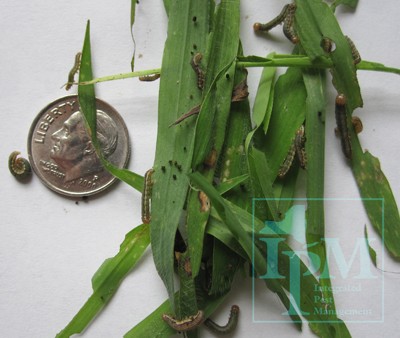Traps being set for black cutworm and armyworm - Watch your fields!
Joshua Putman, Field Crops and Forage Specialist
Southwest New York Dairy, Livestock and Field Crops Program

True Armyworm (aka Common armyworm)
Armyworm moths are long-range migrants that arrive on the spring storms from their southern
overwintering locations. Armyworm moth migrations are somewhat sporadic, cyclic from year to
year and difficult to predict. True armyworms are primarily a pest of
plants in the grass family: forage / pasture /grasses (& lawns), wheat, corn and small grains.
Note: Under hunger stress true armyworms will also attack some legumes and other plants.
Moths lay their eggs on weeds and/or grasses along field margins, on leaves of corn, or on small
grains. Larvae hatch about a week later and develop over approximately a 3 week period, feeding
mostly at night.
Fields at most risk for armyworms feeding are:
1) grass or mostly grass hayfields, pastures. (Armyworms will also feed on grass lawns.)
2) wheat and other small grain fields and cut hay fields
3) corn fields that:
a. were planted into a small grain cover crop (such as rye grass)
b. have grassy weeds, quackgrass, crabgrass and bluegrass and other perennials
c. were planted into burned down sods, have grass weed issues, no-till or reduced tillage
fields, fields with crop residue
d. fields near severely infested small grain and cut hay fields, and in no-tillage corn
established in grain stubble or on grassy land.
Field Crops Specialist, Josh Putman, is getting ready to set traps in SWNY with hopes to capture armyworm moths to better help predict potential infestations on your farm. Contact Josh at jap473@cornell.edu or 716-490-5572 for updates on these timely pests.
Upcoming Events
Boots in the Barn: Cornell Dairy Research Updates
January 13, 2026
January 20, 2026
January 27, 2026
February 3, 2026
February 10, 2026
February 17, 2026
February 24, 2026
Join us for some or all!
Webinar: Converting Old Dairy Barns into swine Facilities
January 21, 2026 : Webinar: Converting Old Dairy Barns into swine Facilities
Tim Terry, Farm Strategic Planning Specialist with Cornell's Pro-Dairy program will share information on what it takes to transition an old dairy barn for swine production. We plan to cover flooring, ventilation, and lighting, considerations for system workability, and more! Registration is free.
Southern Tier Crop Congress
January 28, 2026 : Southern Tier Crop Congress
Belfast, NY
Join SWNYDLFC and CCE Allegany County for the upcoming Southern Tier Crop Congress. CCA and DEC credits are available!
Announcements
Cows, Crops & Critters Newsletter Sponsorship
TRYING TO REACH GROWERS AND AGRIBUSINESSES IN OUR SOUTHWEST REGION OF NEW YORK?Weekly Email Update: Shared with 625+ households who have signed up with our program.
Monthly Paper Mailer: To reach our stakeholders and farmers who lack internet access, we send out a monthly mailer where your company's logo and contact information would be featured with a mailing list of 330+ households.
If you sponsor our weekly and monthly publications you reach approximately 955 households.





